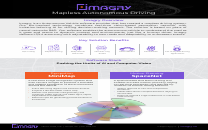
Imagry
Founded Year
2015Stage
Series B | AliveTotal Raised
$28.2MLast Raised
$22M | 3 yrs agoMosaic Score The Mosaic Score is an algorithm that measures the overall financial health and market potential of private companies.
+99 points in the past 30 days
About Imagry
Imagry is an autonomous driving software provider that specializes in HD-mapless, AI-based driving systems for the automotive industry. The company offers a software solution that enables vehicles to navigate roads autonomously without relying on high-definition maps, using real-time vision-based perception and deep neural networks to imitate human driving behavior. Imagry's technology is hardware agnostic, self-sufficient, and can be adapted to various locations and applications, including passenger vehicles, buses, and shuttles. It was founded in 2015 and is based in Haifa, Israel.
Loading...
Imagry's Product Videos


ESPs containing Imagry
The ESP matrix leverages data and analyst insight to identify and rank leading companies in a given technology landscape.
The automotive cameras & computer vision solutions market provides camera-based perception solutions for advanced driver assistance systems (ADAS) and autonomous vehicles. Companies offer hardware including automotive-grade cameras, thermal sensors, and stereo vision systems, as well as software solutions featuring computer vision algorithms, object detection, and AI-powered perception systems. Th…
Imagry named as Outperformer among 10 other companies, including SenseTime, Mobileye, and StradVision.
Imagry's Products & Differentiators
Autonomous Driving Software
We have developed an HD-mapless L3/L4 driving system for passenger vehicles and mass transit buses. Our bio-inspired technology combines real-time vision-based perception and imitation-learning AI to create a driving decision-making network based on the current surroundings. Imagry’s software enables the autonomous vehicle to understand the road as it goes and reacts to dynamic contexts and environments, just like a human driver.
Loading...
Expert Collections containing Imagry
Expert Collections are analyst-curated lists that highlight the companies you need to know in the most important technology spaces.
Imagry is included in 3 Expert Collections, including Auto Tech.
Auto Tech
2,557 items
Companies working on automotive technology, which includes vehicle connectivity, autonomous driving technology, and electric vehicle technology. This includes EV manufacturers, autonomous driving developers, and companies supporting the rise of the software-defined vehicles.
Conference Exhibitors
6,062 items
Companies that will be exhibiting at CES 2018
Artificial Intelligence
12,580 items
Companies developing artificial intelligence solutions, including cross-industry applications, industry-specific products, and AI infrastructure solutions.
Imagry Patents
Imagry has filed 8 patents.
The 3 most popular patent topics include:
- autonomous cars
- artificial neural networks
- compact cars

Application Date | Grant Date | Title | Related Topics | Status |
|---|---|---|---|---|
11/6/2022 | 10/8/2024 | Ribosomal proteins, Artificial neural networks, Autonomous cars, Rally cars, Compact cars | Grant |
Application Date | 11/6/2022 |
|---|---|
Grant Date | 10/8/2024 |
Title | |
Related Topics | Ribosomal proteins, Artificial neural networks, Autonomous cars, Rally cars, Compact cars |
Status | Grant |
Latest Imagry News
Aug 10, 2025
Autonomous vehicles once seemed like a distant dream. Today, two Israeli tech companies, Imagry and Cognata, are accelerating that future by developing the core technologies and infrastructure needed to bring driverless mobility to life. From AI-powered public buses to hyper-realistic virtual simulations that regulators can use to test safety, these companies are redefining what it means to drive and who, or what, is actually driving. Vision Without Maps – Public Transportation Re- invented The Haifa-based startup Imagry has a radical premise, creating fully autonomous driving that doesn't require HD maps or expensive LiDAR sensors. Instead, the company's camera-based system mimics human cognition to deliver real-time driving decisions without preloaded maps and with reaction times three times faster than a skilled human driver. Eran Ofir, CEO of Imagry, claims their technology delivers a system that sees everything and reacts in under 100 milliseconds. That's a third of a human driver's reaction time, making driving not just autonomous but safer. Their system uses eight strategically placed cameras that feed video into neural networks trained on hundreds of millions of images since 2018. These networks each specialize in identifying different objects, such as cars, pedestrians, traffic signs, and combine to produce a 3D, 360-degree map of the environment. The AI then makes decisions using deep convolutional neural networks to process motion planning in real time. Unlike other systems that rely on rigid and costly HD maps, Imagry's mapless architecture offers remarkable flexibility, particularly in dense urban environments where conditions change frequently. Imagry is building AI that thinks like a human driver. Its system is designed to perform perception, interpretation, and judgment in real time, effectively mimicking the way the human brain processes driving decisions. Another key feature is hardware independence. Imagry's platform supports multiple chips and vehicle types, giving it a significant edge in scalability. And thanks to a layered architecture, core tech surrounded by country-specific customizations, it's easily adaptable across international markets, with pilots already underway in the US, Germany, Japan, and Israel. While private autonomous vehicles still face adoption hurdles, Imagry sees public buses as the perfect proving ground. Buses provide an easier example. They follow the same routes, stop at fixed stations, and operate at lower speeds. “AI learns these routines quickly, and global demand is rising due to driver shortages, urbanization, and aging populations. Israel is already on board. In Nahariya, autonomous Bus Line 5 is powered by Imagry and is operational under a Ministry of Transport pilot. Once it reaches 100,000 safe kilometers, the vehicle can move from Level 3 (with a safety driver) to Level 4 (fully driverless). That milestone is expected by 2026. Israel's legislation has also made it a global model. The Innovation Authority and Ministry of Transport moved quickly to make regulatory frameworks a reality… and Europe is now adopting similar laws. Imagry's autonomous parking system, developed with Continental, is already in use in the US and Germany and is expected to become standard in private vehicles within two years. Simulating Reality: Cognata's Virtual Sandbox for Safer AV Testing But how do regulators know these systems are truly safe? That's where Cognata comes in. The Rehovot-based company develops hyper-realistic simulations that allow manufacturers and governments to test autonomous vehicles (AVs) without putting a single person at risk. According to Cognata, simulations aren't just for development anymore. They are enabling regulators themselves to use simulation as a tool for certification. In partnership with Imagry, the Israel Innovation Authority, the Ministry of Transport, and Cognata ran the country's first-ever simulation used as a regulatory decision-making tool. Their virtual world replicates cities, road conditions, weather, and even lighting, while also modeling how sensors perceive these changes. Using supervised generative AI, Cognata renders computer graphics and modifies real driving footage to add fog, dusk, rain, or altered signage, creating highly accurate and repeatable test scenarios. Cognata's system doesn't imagine but modifies reality. That's the only way to ensure safety. Cognata's platform is now being used for a range of autonomous robotics, including forklifts, mining trucks, tractors, and military systems. In fact, the company believes that off-road robotics will go mainstream before autonomous cars do as there's less regulation and fewer pedestrians. It's where the revolution will begin. Both Imagry and Cognata are central players in AVATAR, Israel's national consortium for autonomous vehicle technology, which includes top tech firms, universities, and multinationals like Renault, Nissan, and Mitsubishi. The consortium recently concluded a multi-year project with a demonstration in Tel Aviv, which combined real test drives with virtual simulations. The collaboration exemplifies what makes Israel's innovation ecosystem so effective: early-stage funding, strategic government backing provided by the Innovation Authority at the critical stage, and rapid cross-sector integration. Redefining the Road Ahead Together, these companies are reshaping public expectations and regulatory standards. Whether through real-world autonomous public transit or virtual testing labs, they are paving the road to a safer, smarter, and more flexible transportation future. And while they acknowledge the technical, legal, and societal challenges, they're also clear-eyed about the stakes.
Imagry Frequently Asked Questions (FAQ)
When was Imagry founded?
Imagry was founded in 2015.
Where is Imagry's headquarters?
Imagry's headquarters is located at 53 Derekh HaAtsma'ut, Haifa.
What is Imagry's latest funding round?
Imagry's latest funding round is Series B.
How much did Imagry raise?
Imagry raised a total of $28.2M.
Who are the investors of Imagry?
Investors of Imagry include Samsung Ventures, 2B Angels, Klarman Family Foundation, Takwin, Afifi Group and 6 more.
Who are Imagry's competitors?
Competitors of Imagry include ADASTEC and 5 more.
What products does Imagry offer?
Imagry's products include Autonomous Driving Software and 1 more.
Loading...
Compare Imagry to Competitors

Momenta operates in the autonomous driving technology domain and focuses on developing software solutions for full vehicle autonomy. The company offers products such as MSD, a fully autonomous driving solution designed for taxis and private cars, and Mpilot, a mass-production-ready software for highly automated driving in private vehicles. Momenta's solutions are built on a unique 'flywheel approach' that combines a data-driven methodology with iterative algorithm enhancements to address complex driving scenarios. It was founded in 2016 and is based in Beijing, China.

Wayve develops embodied intelligence for autonomous vehicles within the artificial intelligence and automotive industries. The company specializes in self-driving technology, known as AV2.0, which is designed to help fleet operators implement autonomous vehicle technology at scale. Wayve's technology is notable for being the first to deploy autonomous vehicles on public roads using end-to-end deep learning. It was founded in 2017 and is based in London, United Kingdom.

Uisee Technology focuses on autonomous driving technology and mobility solutions. The company provides self-driving vehicles, including buses, taxis, and delivery vans, along with a smart driving system and platform for different vehicles. Uisee serves sectors that need automated transportation and logistics, including public transport, delivery services, and urban mobility. It was founded in 2016 and is based in Chaoyang District, China.

Applied Intuition focuses on vehicle software development and simulation for the automotive and transportation industries. The company provides tools for developing, testing, and validating driver-assistance systems (ADAS) and automated driving (AD) technologies, along with a platform for managing vehicle software. Applied Intuition serves sectors including automotive, trucking, defense, construction, mining, and agriculture. It was founded in 2017 and is based in Mountain View, California.

Refraction AI specializes in AI-powered last-mile delivery solutions within the logistics and transportation sector. The company offers a range of autonomous robotic platforms designed to safely and efficiently transport goods such as food and retail items directly to customers' doors. Refraction AI primarily serves the restaurant, grocery, and retail industries with its innovative delivery technology. It was founded in 2017 and is based in Ann Arbor, Michigan.

PrishWerna develops artificial intelligence (AI)-powered technologies for the automotive industry, focusing on self-driving and driver assistance systems. Its products include mobility solutions that use artificial intelligence, sensors, and automated systems to allow vehicles to navigate and operate with limited human input. PrishWerna's technology serves various sectors, including urban logistics, mobility analysis, and electric vehicle integration. It was founded in 2024 and is based in Panvel, India.
Loading...
